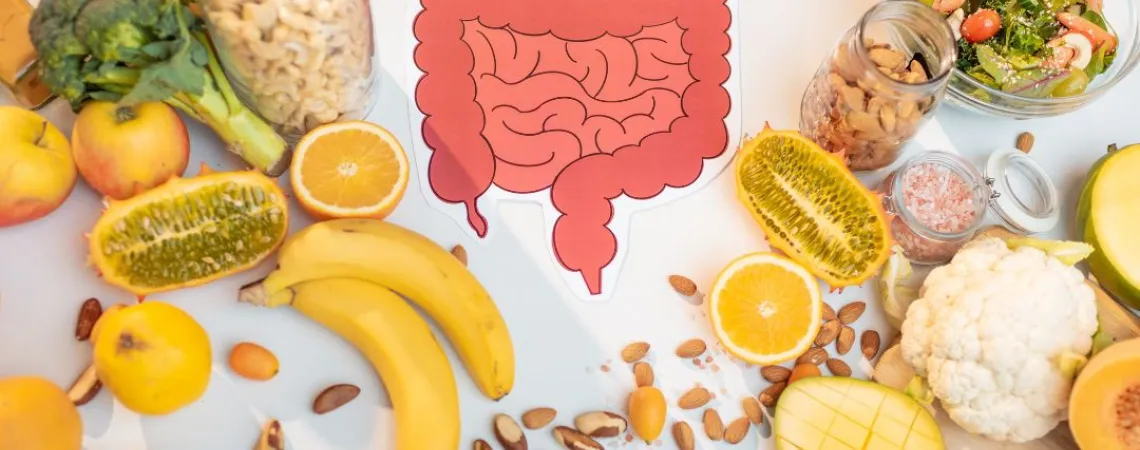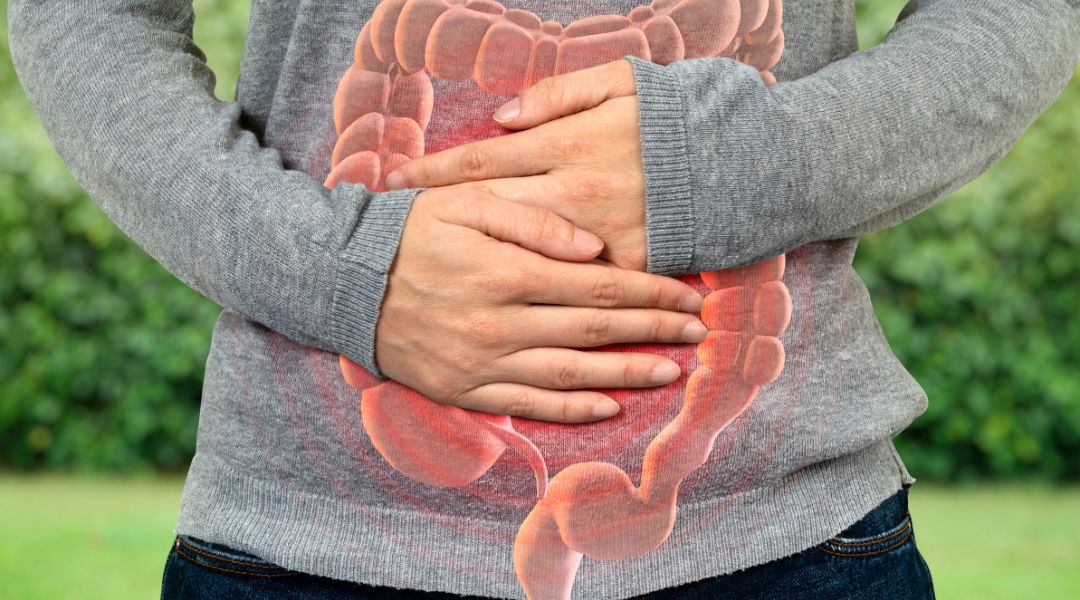
Is digestion making your life difficult? You’re not alone—irritable bowel syndrome (IBS) affects between 10% and 15% of the population.
Good news: simple dietary adjustments and lifestyle habits can make a real difference. Discover accessible strategies to ease discomfort and regain a sense of lightness in your daily life.
What is IBS?

IBS is a functional intestinal disorder that causes discomfort such as abdominal pain, bloating, diarrhea, constipation, or alternating between the two. Unlike some intestinal diseases, it does not cause visible damage, but it can still impact quality of life. Understanding its causes and triggers can help you adopt suitable solutions to ease symptoms.
What Causes IBS?
The exact causes of IBS are not yet fully understood, but several factors may play a role:
- Disrupted gut-brain communication: The brain and gut work together, but in some people, this connection is less effective, which can lead to pain or digestive issues.
- An overly sensitive gut: Some individuals experience normal sensations—such as the presence of gas—more intensely, leading to bloating and pain.
- An imbalanced microbiome: The gut is home to billions of good bacteria, but an imbalance between good and bad bacteria can affect digestion and IBS symptoms.
- Diet and stress: Certain foods or stress can trigger or worsen symptoms. Learning to identify what affects you can help better manage IBS.
How Do I Know if I Have IBS?
There is no single test to diagnose IBS. Diagnosis is based on expert-established criteria (known as the Rome IV criteria), which consider:
- Recurring abdominal pain.
- Changes in bowel movement frequency (too often or not enough).
- Changes in stool appearance (softer, harder, etc.).
Since other health conditions can cause similar symptoms (celiac disease, Crohn’s disease, ulcerative colitis…), it is important to consult a doctor. They can diagnose IBS by ruling out other potential causes and guide you toward the best solutions to relieve your symptoms.
Adopt Healthy Habits for Better Digestion

1. Eat at Regular Times
Try to eat meals at consistent times whenever possible. This can help your digestive system anticipate and process food better. Long fasting periods may increase stomach pain, bloating, or diarrhea episodes.
- Don’t skip meals: Long periods without eating can worsen IBS symptoms.
- Eat smaller meals more frequently: Instead of large meals, opt for three main meals and snacks every 3 to 4 hours.
- Set reminders: A phone alarm or a note in your planner can help you remember to eat.
- Plan ahead: Having a meal ready when hunger strikes is practical! For example, try our Banana and Oatmeal Breakfast Mug Cake for a balanced start to your day.
2. Add Soluble Fibre to Your Diet
Soluble fibre is your ally for better bowel regularity! Whether you experience diarrhea or constipation, soluble fibre helps stabilize digestion while being gentler on the gut than insoluble fibre.
Where to Find It?
- Fruits & Vegetables: Ripe bananas, oranges, strawberries, kiwi, apples, pears, asparagus, carrots, sweet potatoes, squash, zucchini, spinach.
- Grains & Cereals: Oats, barley, quinoa, bran, psyllium, chia seeds.
- Legumes: Beans, chickpeas, lentils.
Tips to Increase Your Intake:
- Add 1 tbsp of chia seeds: In smoothies, salad dressings, cereals, or oatmeal.
- Incorporate legumes: Into soups, salads, or main dishes to boost fibre intake, like these Fibre-Rich Nachos.
- Cook with barley: Swap rice for barley to increase fibre intake, such as spiced barley. Love oatmeal for breakfast? Try this barley pudding for variety.
- Enhance your salads with fruit: Adding fruits and vegetables not only brings vibrant colours to your plate but also increases fibre intake. Try a carrot and orange combination.
💡 Pro Tip: Introduce these changes gradually to give your digestive system time to adjust!
3. Stay Hydrated
Proper hydration helps your gut function well and can reduce bloating, constipation, and digestive discomfort.
- How much to drink? About 2 to 3 litres of water per day (including beverages and water from food). Ideally, spread this intake throughout the day.
- These needs vary depending on age, physical activity, and ambient temperature.
- If plain water is too bland: Add slices of fresh fruit like lemon, cucumber, or strawberries for extra flavour.
- Start your meal with soup: A simple way to boost hydration and fibre intake!
- Fibre + Water = Winning Duo: If you’re increasing fibre intake, make sure to drink enough water to support digestion and prevent constipation.
4. Limit Your Intake of Irritating Foods
Alcohol, caffeine, and high-fat foods can worsen digestive discomfort. Choosing gentler options for your digestive system can help reduce discomfort.
- Avoid fried foods: Cook at home more often, such as Air Fryer fries or homemade fish and chips.
- Reduce caffeine intake: Limit coffee to 3 cups per day (about 400 mg daily). Prefer herbal tea, which is caffeine-free. Also, be mindful of other caffeinated products like soft drinks, energy drinks, tea, and chocolate.
- Reduce alcohol consumption: To lower alcohol intake while still enjoying a drink, try mocktail recipes.
5. Stay Active!
Physical activity stimulates digestion and can help reduce constipation, which is often associated with IBS. Movement helps maintain a regular bowel rhythm, particularly for those with slow transit. Exercise can:
- Reduce stress and anxiety: Stress is a major IBS trigger. Exercise releases endorphins, the “happiness hormones”, promoting well-being and easing digestive discomfort.
- Decrease bloating and gas: Movement helps reduce gas accumulation, minimizing bloating and abdominal discomfort. Natural body movements during exercise encourage better gas evacuation.
- Improve sleep quality: Good sleep is crucial for those with IBS, as sleep disturbances can worsen symptoms.
Where to Start?
- Move for 150 minutes per week at moderate to high intensity.
- Moderate activities: Brisk walking, cycling, dancing, swimming, yoga, light strength training, or jogging—just be mindful, as intense exercise may sometimes worsen symptoms in certain individuals.
- Stretching and breathing exercises: Try yoga poses like child’s pose or seated twists to relieve cramps and bloating.
- Walk after meals: A 15 to 30-minute walk can aid digestion and reduce bloating.
Additional Tips for Better Digestion

- Stress management: Incorporate calming practices into your routine, such as meditation, yoga, or deep breathing exercises, to reduce stress’s impact on digestion.
- Food tracking: Keep a food and symptom journal to identify foods that worsen symptoms and tailor your diet accordingly.
- Low-FODMAP diet: If symptoms persist despite healthy habits, a low-FODMAP diet may be an option—discuss it with your registered dietitian.
Regain Digestive Comfort in Your Daily Life
Managing IBS doesn’t have to mean drastic restrictions. By adopting simple habits—such as regular meals, more soluble fibre, and appropriate physical activity—you can reduce symptoms and improve your quality of life.
Everyone is different, and finding what works for you can make all the difference. For compassionate, personalized support, book an appointment with a registered dietitian.

